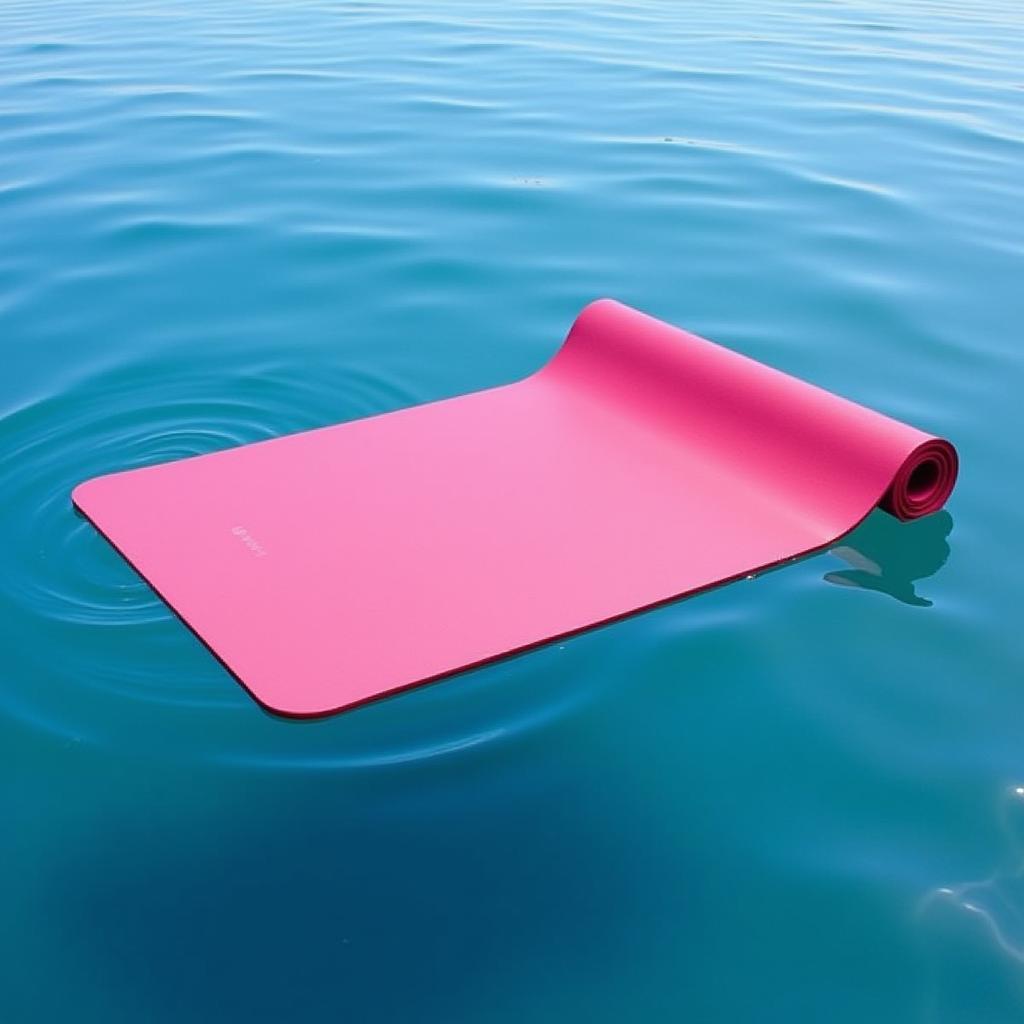Do Yoga Mats Float? The Surprising Truth
December 21, 2024Do Yoga Mats Float? It’s a question you might not have considered until you’re packing for a paddleboard yoga session or perhaps just curious about the buoyancy of your trusty mat. The answer isn’t always straightforward, and depends on several factors, including the material of the mat, its thickness, and the water conditions. Let’s dive into the fascinating world of yoga mat buoyancy.
What Makes a Yoga Mat Float (or Sink)?
Material Matters: Decoding Yoga Mat Composition
The primary factor determining whether a yoga mat will float is its material. Closed-cell mats, typically made from materials like PVC (polyvinyl chloride) or NBR (nitrile butadiene rubber), are generally more buoyant due to their air-trapped structure. These materials are naturally less dense than water, allowing them to float. On the other hand, open-cell mats, often made from natural rubber or TPE (thermoplastic elastomer), tend to absorb water, increasing their density and causing them to sink.
 Closed-cell yoga mat floating on water
Closed-cell yoga mat floating on water
Thickness and Density: How They Impact Buoyancy
Even within the same material category, thickness can play a significant role. A thicker closed-cell mat will generally be more buoyant than a thinner one, simply because it displaces more water. Conversely, a thicker open-cell mat will likely absorb more water, making it sink faster. Density is also crucial. A denser mat, regardless of material, will be less likely to float.
Water Conditions: Calm vs. Turbulent Waters
The conditions of the water can also influence a yoga mat’s buoyancy. In calm, still water, a closed-cell mat is more likely to stay afloat. However, in choppy or turbulent water, waves can easily submerge even the most buoyant mats. Furthermore, saltwater is denser than freshwater, so a mat that floats in a lake might not float in the ocean.
Testing Your Yoga Mat’s Buoyancy
It’s always best to test your yoga mat’s buoyancy in a controlled environment before taking it out on the water. Simply fill a bathtub or sink with water and place your mat on the surface. Observe whether it floats or sinks, and how quickly it absorbs water. This simple test can save you from a soggy surprise during your next aquatic yoga adventure.
Expert Insights: Dr. Aqua Marina, Marine Physicist
“The buoyancy of any object is determined by Archimedes’ principle, which states that the upward buoyant force is equal to the weight of the fluid displaced by the object. When it comes to yoga mats, the material and its density play a key role in determining how much water it displaces, and therefore, its ability to float.”
Choosing the Right Mat for Water Activities
If you plan on using your yoga mat for water activities like paddleboard yoga, opt for a closed-cell mat made from PVC or NBR. These materials are more likely to float and are also easier to clean and dry. Look for a mat with a textured surface to provide better grip in wet conditions.
Conclusion: Staying Afloat with Your Yoga Mat Knowledge
So, do yoga mats float? The answer is: it depends. Understanding the factors that influence buoyancy, such as material, thickness, and water conditions, can help you make an informed decision when choosing a yoga mat for your next water-based workout. By selecting the right mat and testing its buoyancy beforehand, you can enjoy a peaceful and dry yoga session on the water.
FAQ
- What type of yoga mat floats best? Closed-cell mats made from PVC or NBR.
- Will my yoga mat float in the ocean? Saltwater is denser, so a mat that floats in freshwater might not float in the ocean. Test it beforehand.
- Can I make my yoga mat float? Not effectively. Adding flotation devices could interfere with your practice.
- Why does my open-cell mat sink? Open-cell mats absorb water, increasing their density and causing them to sink.
- How can I test my mat’s buoyancy? Fill a tub with water and place your mat on top to see if it floats.
- Are floating yoga mats expensive? Not necessarily. Many affordable closed-cell mats offer good buoyancy.
- What if my yoga mat gets wet? Closed-cell mats are easy to wipe dry. Allow open-cell mats to air dry thoroughly.
Do you have other questions?
Need more assistance? Contact us! Phone: 0915117113, Email: fanyamal@gmail.com or visit us at: Hamlet 3, Binh An, Phu Thuong, Vietnam, Binh Phuoc 830000, Vietnam. We offer 24/7 customer support.